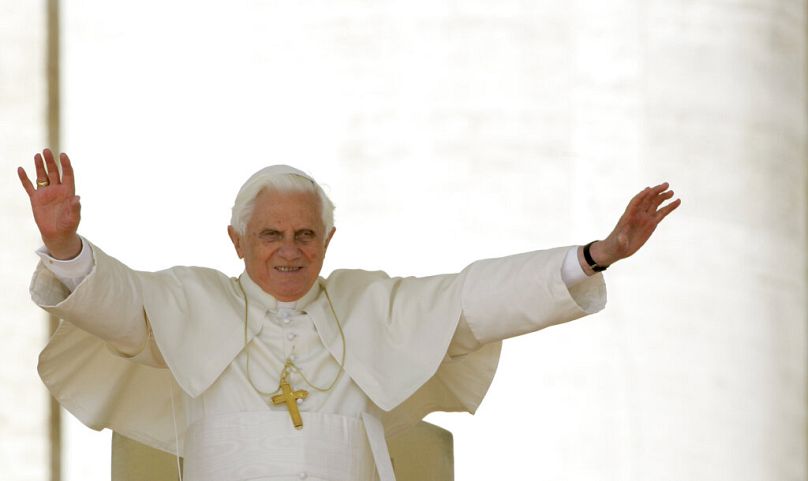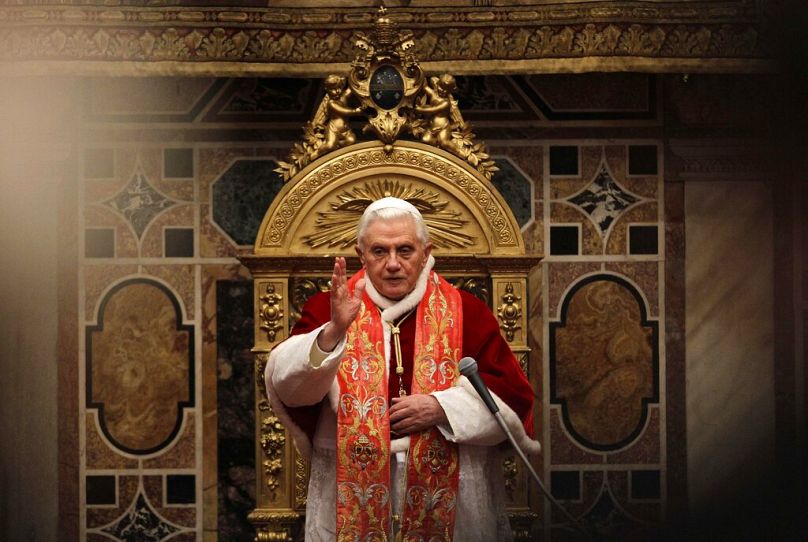Benedict died on Saturday morning in the monastery in the Vatican gardens where he had retired.
Pope Francis has lead the tributes to his predecessor Pope Emeritus Benedict XVI, who has died at the age of 95.
 ADVERTISEMENT
ADVERTISEMENT
 ADVERTISEMENT
ADVERTISEMENT
The Vatican confirmed Benedict's death on Saturday morning, saying he passed away at a monastery on Vatican grounds where he had lived since 2013.
Giving his homily at the end of year celebration of Vespers and the Te Deum -- Catholic religious ceremonies -- Pope Francis remembered Benedict as a noble and kind man of faith.
"We are moved as we recall him as such a noble person, so kind. And we feel such gratitude in our hearts: gratitude to God for having given him to the Church and to the world; gratitude to him for all the good he accomplished, and above all, for his witness of faith and prayer, especially in these last years of his recollected life," said Pope Francis.
"Only God knows the value and the power of his intercession, of the sacrifices he offered for the good of the Church.”
Benedict became the first pope in 600 years to retire from the role and his health had declined in recent years. Over the last few days his health had deteriorated further, but the Vatican had indicated on Friday that his condition was "stable" and that he had participated in the celebration of mass in his room the previous day.
Funeral to take place next week
A Vatican spokesperson confirmed that the funeral of former Pope Benedict will take place next Thursday 5 January at 09:30 CET in St. Peter's Square, and be presided over by Pope Francis.
"From the morning on Monday, the body of the Pope Emeritus will be in the Basilica of Saint Peter, where the faithful can go with their prayers for a last meeting with the Pope Emeritus, to greet him and to say goodbye," Matteo Bruni added.
The funeral of the 265th pope, celebrated by his successor, will be an unprecedented event in the two thousand year history of the Catholic Church which tens of thousands of people are likely to attend, including heads of state.
European leaders paid tribute to Pope Emeritus Benedict on Saturday, including Italian Prime Minister Giorgia Meloni, French President Emmanuel Macron, German Chancellor Olaf Scholz, and British Prime Minister Rishi Sunak.
Who was Pope Benedict, the first German pope in a thousand years?
Pope Emeritus Benedict's death puts an end to the unusual cohabitation of two men in white: the German Joseph Ratzinger, a brilliant theologian not very comfortable with crowds, and the Argentinian Jorge Bergoglio, a Jesuit endowed with an incisive word who wanted put the poor and migrants back at the center of the Church's mission.
Benedict was the first German pope elected to head the Catholic church in thousand years when he succeeded John Paul II in April 2005.
Then known as German Cardinal Joseph Ratzinger, he became the 265th leader of the Roman Catholic Church, choosing the name Benedict XVI.
His appointment came after he had headed the Vatican's Congregation for the Doctrine of the Faith from 1982 to 2005.
At the time, Benedict was labelled by one cardinal as a “safe pair of hands” but his eight-year papacy was marked by missteps and scandals.
Benedict was also the first pope to retire in 600 years.
Joseph Ratzinger was born to a Catholic family on 16 April 1927 in Marktl am Inn, a small village in southeast Germany. He spent much of his adolescence here, near the Austrian border.
He often described himself as a “Mozartian” and enjoyed playing the piano throughout his life.
After his 14th birthday in 1941, Ratzinger enrolled in the Hitler Youth.
Membership in the Nazi organisation was legally required at the time, and the teenage boy remained in the Hitler Youth to avoid tuition fees, later enrolling in the auxiliary anti-aircraft service at the end of World War II.
Ratzinger was eventually exonerated and even embraced by some Jews -- he called the Holocaust a "dark time" in his life.
After studying philosophy and theology at the University of Munich, he was ordained a priest in 1951, alongside his brother Georg.
Abuse scandals
Cardinal Joseph Ratzinger then served as archbishop of Munich from 1977 to 1982.
This period of his life later came under particular scrutiny amid widespread allegations of sexual abuse within the Catholic Church.
Although his legacy was damaged by the scandal, Benedict was responsible for turning around the Vatican’s approach to abuse by the clergy.
He was the first pope to meet with victims of abuse and directed the church to pursue a path of humility by seeking forgiveness. In 2001, he ordered for all cases to be sent to his office for processing, once he saw that accused bishops were being moved from parish to parish and not being punished.
During the final two years of his pontificate, Benedict defrocked nearly 400 priests for abuse.
But in 2018, a church-commissioned report concluded that at least 3,677 people were abused by the clergy in Germany between 1946 and 2014.
Another long-awaited report then accused Benedict of mishandling four sexual abuse allegations in the Munich archdiocese. He was criticised for failing to remove priests, even after they had been criminally convicted.
In February, Benedict asked for forgiveness for any “grievous faults”, but did not admit to any personal wrongdoing.
Earlier in his papacy, Benedict XVI had faced other criticisms and controversies.
In 2006, just one year after being elected, he caused ire when he suggested that Islam brought only evil to the world. Following days of protests, Benedict said he was "deeply sorry" and that his speech was misunderstood.
Less than three years later, he also angered Jews by rehabilitating four ultra-traditionalist bishops, including a Holocaust denier.
In 2012, the “Vatileaks” scandal – which unearthed financial corruption and blackmail – also shook Benedict’s papacy.
In a shock announcement in February 2013, the then-86-year-old said he lacked the "strength of mind and body" to run the Church and bowed out.
In his later years, Benedict grew increasingly frail as he dedicated his post-papacy life to prayer and meditation.
Francis, who visited the former pontiff shortly after his general audience on Wednesday (December 28), has often praised Benedict, saying it was like having a grandfather in the home.
One of the last known photographs of Benedict was taken on 1 December, when he met the winners of a prize for theologians named after him.












